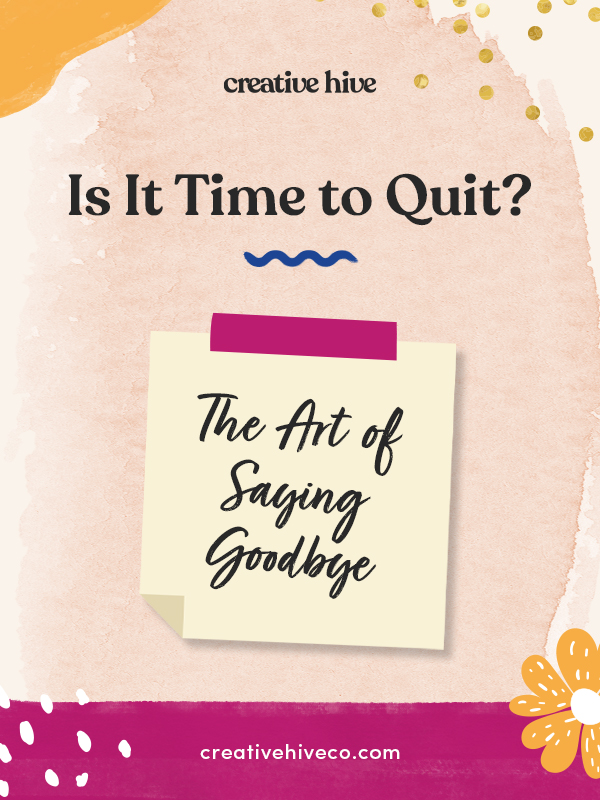I want to help you build a sustainable, profitable handmade business that makes you consistent income and sales. I only ever teach or recommend marketing, social media, pricing, production and branding tips that I’ve personally used successfully in my own 7-figure handmade businesses.
I'm Mei, from Los Angeles!
Read More
Popular Posts You'll Love
Looking for something?
Categories
starting a business
get more traffic
running a business
make more sales
branding
growing a business
mindset & productivity
podcasts
pricing & money
product photography
reviews
selling on etsy
selling on amazon
social media
selling wholesale
- Facebook0
- Twitter1
- Pinterest0
- 1share
So many businesses have closed down this year.
Just today, I saw two small businesses throw in the towel.
It’s scary and it’s sad.
Closing down a business marks the end of such a beautiful era.
Perhaps you’ve felt the weight of these struggles yourself.
Sales have been really hard lately, so I won’t blame you if you’ve thought about quitting at least once.
I understand where you’re coming from.
So, in this blog post, I’m not here to tell you to just keep going, no matter how tough it gets.
I want to talk about quitting – what it means and how to know if doing it is the right decision for you and your business.
I want to use my platform not just to talk about how to build a handmade business from scratch and make more sales, but also to confront the hard stuff and the realities that a lot of us face.
Conversations like this are important to have because it makes us feel less alone and it can also destigmatize some of the most commonly held beliefs about running a handmade business.
So, let’s talk about the art of quitting and saying goodbye.
Quitting is an art
Quitting, I’ve come to believe, is an art form.
It’s hard, yet it’s too easy.
It’s hard to balance out knowing when to persevere and when to let go.
But it’s also so easy to just throw in the towel and never think about the consequences again.
It’s quite the paradox, right?
Here’s what I see happening to a lot with creatives in business.
People don’t quit at the right time.
Some people quit too early. Some people quit too late. And some people never quit at all.
All of that results in outcomes that no one really wants.
The early quitters never get to see their dreams come true.
The late quitters waste time and other precious resources like money and energy.
The never quitters lead an unhappy life forever.
For us, handmade business owners, a couple of examples include …
Posting on Instagram even if it takes so much from us, but we don’t know when or if we should quit doing it,
Or continuing to do craft shows even when they’re no longer profitable,
Or selling on Etsy even when it brings us more problems than it’s worth.
So why do we struggle so much around quitting?

The fear of failure
As entrepreneurs, we’re often conditioned to view quitting as a sign of failure.
That’s why I think there’s a lot of fear around quitting.
If someone’s an early quitter, they might fear commitment.
They avoid any feelings of uncertainty and vulnerability.
A lot of their limiting beliefs revolve around these phrases:
“I can’t do it.”
“I’m not good enough.”
“This is too hard.”
“I don’t get it.”
As a result, the idea of committing fully to something becomes so scary and intimidating.
They usually worry that their efforts might not measure up to their expectations.
So they quit before even taking a bit of time to figure it out or when they see that there’s some learning to be done.
There’s also a lot of judgment around quitting.
If you quit, then it simply means that you’re giving up. You’ve failed.
Quitting is thought to be a sign of weakness, which is why there’s a lot of shame around that.
So the late quitters and the never quitters just keep hitting their heads against the wall even if it’s hurting them, out of fear of being judged as a failure.
Because, then, even YOU will judge yourself as a failure, right?
But this only leads to unhappiness, lost opportunities, and lost time – just a heck of a lot of not-nice things.
You will keep being stuck doing something or being in something that doesn’t bring you joy, or worse, actually hurts you or deprives you of something better.
But what if we start practicing no judgment around quitting?
Reframing the concept of quitting
Have you seen someone quit a toxic relationship, and think they’re so brave?
It’s brave to quit.
To withstand the possible judgment from others and from yourself.
To leave what you’ve always known for the unknown.
That’s scary!
But quitting, in some circumstances, is the smart and right thing to do.
What if we viewed it not as a symbol of defeat, but as an act of courage and self-awareness?
It’s about recognizing when the path forward may no longer align with your goals or values.
Quitting, then, frees you up to do other things that might be better for you.
But, now, the big question is: how do you figure out the best timing for quitting?
The answer to this hinges on your ability to figure out which type of quitter you tend to be.

The types of quitters
Whether we lean towards quitting too early, too late, or not at all, each approach to quitting carries its own set of challenges and consequences.
So which one are you?
The Early Quitter
Some people quit before they even or have barely tried.
They might have some very valid reasons to quit early, but that’s usually covering up for fear.
They’re too scared to start or keep going.
Usually there is a fear of success, failure, or the unknown.
And these anxieties can sabotage their ability to persevere and work toward their goals.
For early quitters, you just need to keep going.
Suck it up. See it through. Have patience. You can do it.
Rather than seeking instant gratification or immediate results, you should be willing to invest the time and effort necessary to achieve your goals.
Don’t even think about quitting before you’ve even given it your all.
Hold yourself accountable and committed to the thing you’re doing for a couple more weeks or months longer than you normally do.
Yes, even when the going gets tough.
The Late Quitter
The late quitters should’ve quit much sooner.
They’ve been too patient and too tolerant of something that wasn’t serving them anymore.
They fall for the sunk-cost fallacy, a phenomenon where a person is hesitant about quitting because they’ve already invested so much of their time and energy in it.
So they keep working at it, despite the challenges and setbacks, in hopes that it’ll get better.
But it doesn’t.
They remain in unproductive and unhappy situations, and the possibilities of it improving start to slim down.
Their patience is a virtue.
But this is also a business and you’re the boss.
Your patience may become a liability if you continue this.
You, alone, bear the responsibility of ensuring the business’ success and sustainability.
This means making difficult decisions, including recognizing when to pivot, adapt, or, in some cases, abandon ship.
Make sure that you don’t take too long before you cut your losses and move on.
The Never Quitters
The never quitters are the saddest ones out of the bunch.
They never know when to say no, or when enough is enough, or that they deserve better and are worthy of more.
Like the late quitters, they persist in situations long past the point where it is beneficial for themselves and for the business.
They are unable to break free from self-imposed limitations and steer course.
They continually endure despite knowing that their efforts are already futile.
This often leads to prolonged suffering, missed opportunities, and a sense of resignation to their circumstances.
Since they are reluctant to let go, they are stuck in a cycle of stagnation and unhappiness, preventing them from growing and realizing their full potential.
To the never quitters: just quit.
There is no perfect time to quit, but there comes a point when the costs of persisting outweigh the benefits.
Just do it, that is your only mission.
It’s completely okay to admit defeat.
Conclusion
Honestly, I’m all three types of quitters, with a tendency to be more of a late quitter and sometimes an early quitter.
Quitting doesn’t mean failure.
It’s not a reflection on you or your self worth.
It’s actually a very courageous thing to do.
This shift in perspective will allow you to detach your sense of self-worth from the outcomes of your actions, empowering you to make decisions based on what is in your and the business’ best interests.
Many people are too afraid to quit, especially when they don’t know what’s on the other side once they take that leap.
In fact, most people hold on to more things than they should.
Holding on to these burdens only perpetuates unhappiness and prevents personal growth.
So, it’s important to recognize that growth and opportunity often lie on the other side.
It’s time to quit when the situation is no longer serving you.
To my early quitters, be patient and commit to your goals. You’ll never know if you’ll succeed if you never try.
To my late and never quitters, it’s okay to quit when necessary and to let go of what no longer aligns with your values and aspirations.
Now, I have a question for you.
What’s 1 thing you might quit or keep doing today?
Let me know in the comments.

Leave a Comment
Liked this article? Share it!
Unlock a Profitable Handmade Business
in Just 12 Weeks Without Using Etsy
or Social Media
FREE WORKSHOP
This workshop is for anyone who makes and sells a handmade or physical product, including jewelry designers, artists, paper designers, bath & body product makers and more!
What You'll Discover
The #1 mistake people make with Etsy & social media that causes shops to FLOP
The secret to making it with your handmade shop so it's no longer just a hobby
How to make sales in your handmade shop with ease so you can finally get to 6-figures
TAKE ME THERE
Your email address will not be published. Required fields are marked *
Leave a Reply Cancel reply
About
Blog
A Sale A Day
Student Login
Free Class
Contact
Terms
Become A Student
Watch On YouTube
Student Reviews
See My Handmade Shop!



do you have an email for working contact?
I am happy this post has been useful. By any chance if you stumble upon newer sites, do let me know. I will surely update and help other bloggers.
Internship program
Such a nice blog! Thanks for sharing this with us! https://www.e-zpassct.com
Your article content is very good! Official Site
Very inspirational article, sometimes letting go is courage, and knowing when to say goodbye is an art. 99 nights in the forest